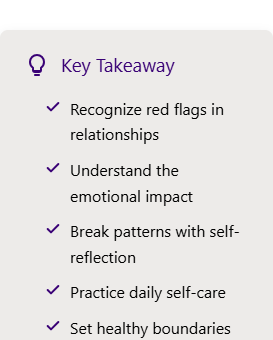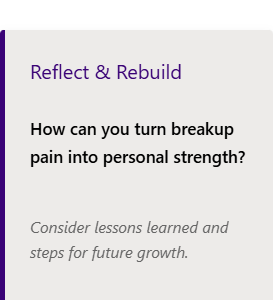Toxic Breakup Recovery: Healing Young Hearts and Finding Strength

Rise Beyond Toxic Breakups
Navigate toxic breakup recovery with self-care and strength.
Toxic Breakup Recovery: Introduction
Navigating the emotional landscape of toxic breakups can be overwhelming, especially for young individuals experiencing intense feelings for the first time. When relationships turn harmful, understanding how to process pain and rebuild becomes crucial. This guide explores toxic breakup recovery, offering compassionate strategies to help you transform challenging experiences into opportunities for personal growth and emotional resilience.
Understanding Toxic Relationship Dynamics
Exploring the psychological complexities of toxic relationships and their impact on emotional well-being.
- Recognizing Relationship Red Flags: Learn to identify warning signs early by recognizing relationship red flags. These indicators include persistent disrespect, controlling behavior, emotional manipulation, and consistent boundary violations. Understanding these signals empowers you to make healthier relationship choices.
- Emotional Impact of Toxic Connections: Toxic relationships can profoundly affect self-esteem and emotional health. The constant cycle of manipulation, gaslighting, and inconsistent behavior creates psychological instability, leading to anxiety, depression, and diminished self-worth. Recognizing these impacts is the first step towards healing.
- Breaking Patterns of Harmful Relationships: Interrupting toxic relationship cycles requires self-awareness and intentional action. Reflect on past relationship patterns, identify personal triggers, and develop strategies to choose healthier connections. This process involves understanding your emotional needs and setting clear, compassionate boundaries.
Practical Actions:
- Utilize a self-reflection journal to document relationship experiences and emotional patterns.
- Create a support network of trusted friends and family who can provide objective perspectives.
- Consider professional counseling to develop deeper insights into relationship dynamics.
Remember: Recognizing toxic patterns is an act of self-love and empowerment. Each insight brings you closer to healthier, more fulfilling relationships.
In every ending lies the potential for a new beginning. Embrace toxic breakup recovery as a pathway to personal growth and resilience.
Emotional Recovery and Healing Strategies
Developing comprehensive approaches to process breakup pain and rebuild emotional strength.
- Navigating Breakup Grief: Breakup grief is a complex emotional journey involving multiple stages. Allow yourself to experience emotions without judgment, understanding that healing isn’t linear. Heartbreak recovery tips can provide structured guidance through this challenging period.
- Self-Care and Emotional Restoration: Breakup grief is a complex emotional journey involving multiple stages. Allow yourself to experience emotions without judgment, understanding that healing isn’t linear. Heartbreak recovery tip can provide structured guidance through this challenging period.
- Rebuilding Self-Worth: Use this transition as an opportunity for profound personal growth. The Love Deserved journal can help foster self-love and acceptance, reminding you of your inherent value beyond romantic relationships.
Practical Actions:
- Create a daily self-care ritual that prioritizes your emotional and physical health.
- Practice positive affirmations that reinforce your self-worth and resilience.
- Explore new hobbies and interests that expand your sense of self beyond the relationship.
Remember: Healing is not about forgetting, but about transforming pain into personal strength. Each step you take is a powerful act of self-love and resilience.


Building Future Relationship Wisdom
Transforming breakup experiences into opportunities for personal growth and healthier connections.
- Learning from Past Experiences: Critically reflect on past relationship dynamics without self-blame. Identify patterns, understand personal triggers, and develop strategies to make more empowered relationship choices in the future.
- Establishing Healthy Boundaries: Learn to communicate and maintain clear, compassionate boundaries. This involves understanding your emotional needs, expressing them clearly, and being willing to prioritize your well-being in future relationships.
- Cultivating Emotional Intelligence: Develop deeper emotional awareness by studying relationship dynamics, practicing empathy, and continuously working on personal growth. This approach helps create more authentic, respectful, and fulfilling connections.
Practical Actions:
- Engage in ongoing personal development through reading, therapy, or support groups.
- Practice vulnerability and honest communication in all relationships.
- Maintain a growth mindset that views challenges as opportunities for learning.
Remember: Your past does not define your future. Each relationship experience provides valuable lessons that contribute to your personal evolution and emotional wisdom.
Conclusion
Toxic breakup recovery is a transformative journey of self-discovery, healing, and empowerment. By understanding relationship dynamics, practicing compassionate self-care, and continuously growing, you can turn painful experiences into profound personal strength. Remember that your worth is not determined by past relationships, but by your resilience, self-love, and commitment to personal growth. Embrace this journey with courage, knowing that each step brings you closer to healthier, more authentic connections.